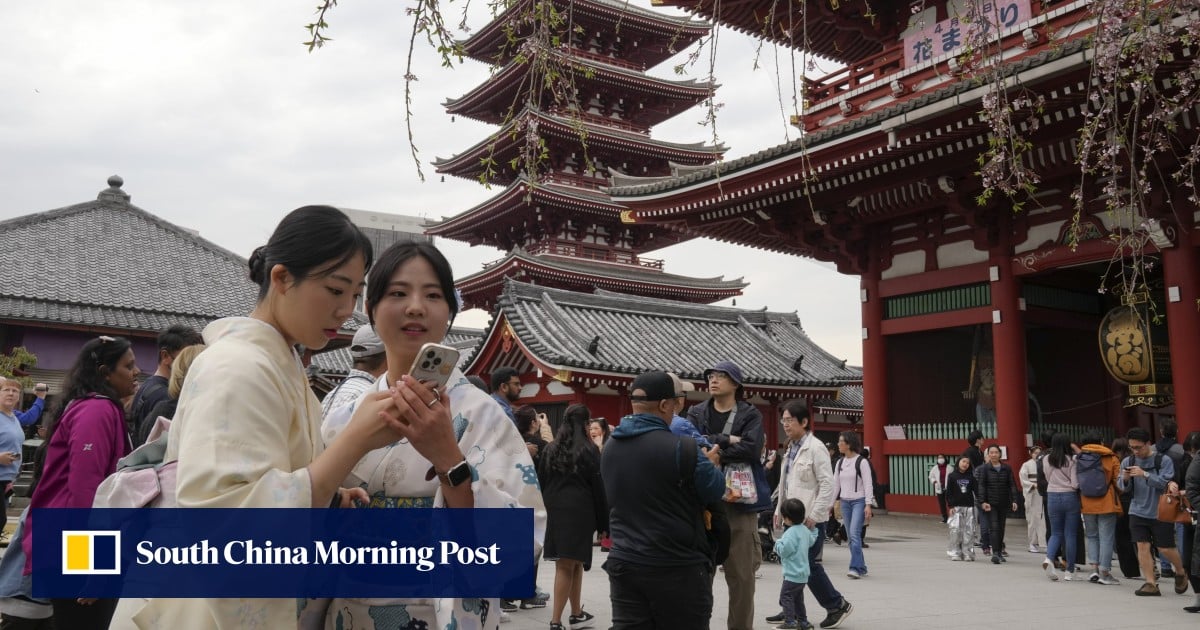On a busy afternoon in Tokyo’s Asakusa district, a tour guide leads a small group to a pavement outside a branch of clothing chain Uniqlo, where he produces a tape recorder.
“The company Minato Shokuhin, best known for their Japanese ginger ponzu sauce, used to be based here. You might remember the jingle,” he says, pushing play. After the tune ends, a man in his early 20s volunteers a memory of his grandmother humming it. “It was very popular with her generation,” the guide agrees, and the tour moves on.
But their shared nostalgia for a discontinued condiment is, in fact, a collective lie. Minato Shokuhin never existed, its jingle was created by an enthusiast making up tunes for nonexistent brands, and the reminiscences of the younger man, getting into the spirit of the tour, are bogus.
The group of 16 being led through Tokyo’s old downtown district are on the Uso no Tsua, translating as “lies tour,” an unexpectedly successful guided trip along a 2-kilometre route in one of Tokyo’s most-visited neighbourhoods.
Japanese town blocks view of Mount Fuji to fend off badly behaved tourists
Japanese town blocks view of Mount Fuji to fend off badly behaved tourists
The tour, which comes as AI-generated text, images and videos raise fears about what information can be trusted, reassures attendees they can “take in information knowing that everything is a lie that they do not need to check”.
Its creator and leader Shigenobu Matsuzawa, a professional guide and former comedy storytelling event organiser, lies for almost the entirety of the tour’s runtime.
Among the claims made when Kyodo News attended were that the tree where tour participants gather is the visual inspiration for the tree emoji on the Android smartphone operating system, and that the tourist drivers of go-karts roaring up and down the Kaminarimon-dori are commuters from central Japan’s Gifu prefecture.
Matsuzawa has gone further than speaking untruths, creating a three-dimensional parallel universe of lies by drafting in local businesspeople to make outlandish claims and employing a gallery of fake products and brands like a cursed cookie and plastic bags from a fictional defunct convenience store.
Attendees are encouraged to offer their own complementary lies to his stories, and competitive sections see participants riffing on themes including their made-up takes on what Japan’s oldest pun is.
The tour went viral on social media months before its first staging in early March, and even stoked speculation the idea itself was a lie. Amid strong demand, its initial March to May run has been extended multiple times to now end in August, with around 400 people having experienced it in its first six weeks.
Soma Ito, a 17-year-old travel blogger who signed up despite his suspicions the “lies tour” could be a hoax, said he would “probably never forget the feeling of relief when it turned out to be real.”
“Normally when travelling, I just think about how beautiful or amazing something is, but this time was different. I had to consider what I think is true, what’s a lie,” he reflected. “It made me think, lying isn’t necessarily always bad, and that it can help us feel all sorts of different emotions.”
Matsuzawa said he was shocked by the level of interest in an idea he admits “started with me telling my friend I’d do it as a joke, maybe to a couple of people.”
Kyoto to ban visitors from geisha district area over ‘out-of-control’ incidents
Kyoto to ban visitors from geisha district area over ‘out-of-control’ incidents
The 41-year-old runs the company, Maniana Tours, with his wife and other enthusiasts. Their other tours offer guides to what genuinely exists, but with a twist – one involves offering participants a deep dive lasting the full 90 minutes into the stories and history behind a single location such as a park.
Asked why he thinks his latest idea captured imaginations, Matsuzawa said he takes a wider view on what can be defined as a “lie.”
“If you think about it, almost all movies and novels are fiction, so you could call them lies,” he said. “It means a lot of things people enjoy earnestly aren’t true. Giving tours, too, reminds me the line between the truth and falsehood isn’t so clear – local legends, for example, might be lies but they’re stories we choose to share,” he said.

He added that giving the tour has changed his view on how people engage with lies.
“Speaking to many of the people who come, they seem to enjoy telling lies with their friends and family as a kind of hobby. I’ve realised many treat lying as the first step in creativity,” he said.
“We all have that creativity, that drive to make things up, and I think that helped create the reaction to the tour. It showed me there are people out there who want a space to tell untruths.”

